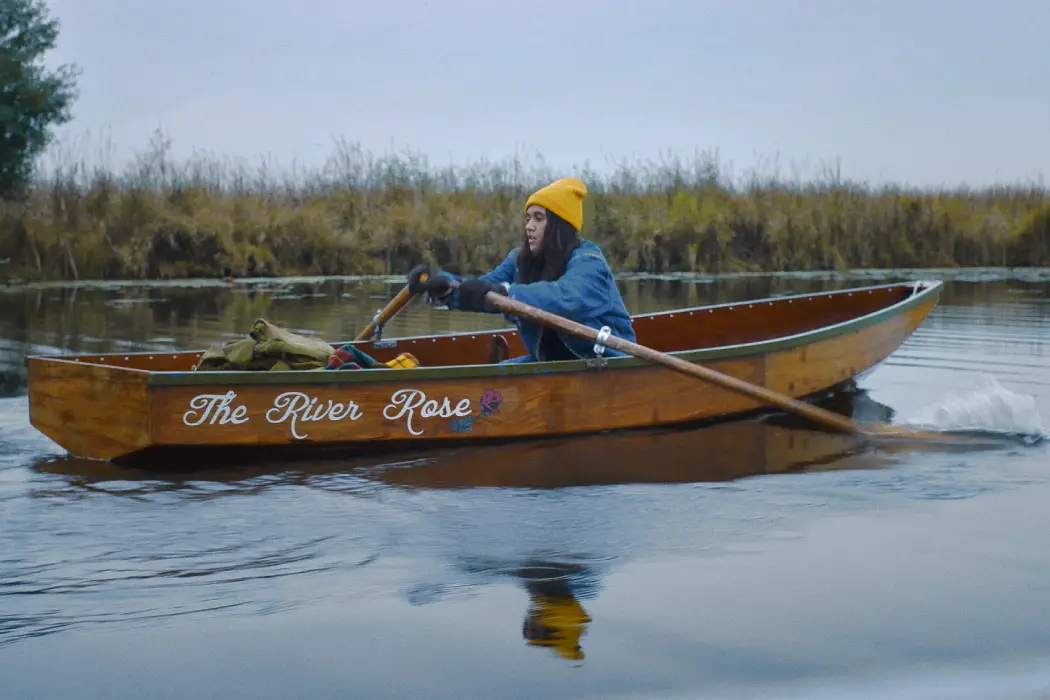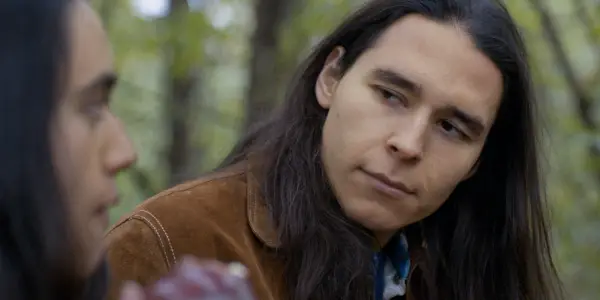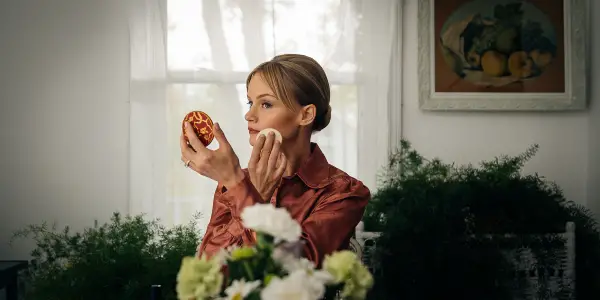ONCE UPON A RIVER: A Debut as Strong As Its Dark Currents

Bailey Jo is a visual journalist currently living near Seattle.…
What do you do when your center of gravity shifts so drastically that you can’t help but begin to float away; when your mother leaves you, your uncle rapes you, and your father dies because you try to seek your revenge, what do you do? As Haroula Rose’s feature-length directorial debut, Once Upon A River shows us, you do what you can.
For 15-year-old Margo Crane, a Native American girl living in 1977 rural Michigan, this means taking the rowboat her grandfather left her and setting off down the river to find the mother who abandoned her and, maybe, some semblance of solid ground in a world that sees no issue in crumbling the foothold of a teenage girl.
Once Upon A River is a film that takes a simple coming-of-age story, with a hint of Mark Twain-esque odysseys, and then twists and turns it into something brutal and enveloping; changing into something resembling a tale that many women can recite by heart.
Like the 2011 Bonnie Jo Campbell novel of the same name, Once Upon A River follows Margo (Kenadi DelaCerna, in her acting debut), a quiet girl who finds solace in simple things like her hunting rifle, her worn-out biography of Annie Oakley, and the muddy Stark river where she hunts, swims, and contemplates the departure of her mother, a woman who we learn couldn’t stand the “river stink.” The film establishes early-on that with every good thing that Margo clings to, there’s something backhanded and traumatizing attached to it; showing that even if you have the tools to survive, you’re rarely the one in control. Margo is a very capable and self-assured girl, but the river she loves is polluted in part by the factory that her father’s white half-brother, Cal Murray (Coburn Goss) runs. Her uncle Cal praises her for her sharp-shooting skills, but ultimately grooms her into wanting to have sex with him. She then uses her skills to get her revenge on her uncle by shooting him in the penis, but her beloved father Bernard (Tatanka Means) is blamed and is ultimately killed by her cousin Billy (Sam Straley). These are the tragic chain of events that set her down the river in search of her estranged mother.
Power and Control
Some major themes that play throughout the film are the concepts of power and freedom, and this hanging sense of danger that women can’t help but be so attuned to. While Margo has real power in her survival skills, she is still very much at the mercy of her environment; for a good chunk of the film, the only calm and peace are the solitary scenes of Margo as she fishes, hunts, and skins a rabbit. Every time a new person enters her riverside sanctuary, one can’t help but feel the hackles rise as every person she meets on her journey is a strange man.

The film does a great job of making the viewer feel that anxiety that many women who find themselves alone can’t help but feel, and a familiar panic when Margo does what she can in the given situations, like seeking help from an older man (Dominic Bogart) who was previously not shy about his inappropriate attraction to her (“I just can’t get enough of girls who don’t talk.”) or preparing to defend herself when her cousin Billy (who had made sexual comments towards her as well) ends up stealing her boat.
These anxieties hover throughout the film, even when Margo comes across decent men on her odyssey. The first of whom is Will (Ajuawak Kapashesit), a young Cherokee man traveling from Oklahoma who Margo takes a liking to. He’s kind and respectful of her and offers to give her a ride so that she doesn’t have to hitchhike. His altruism seems to come from wanting to help out a fellow Native American but it doesn’t take too long before he lets his attraction to her be known. Over a few days, they camp out together, take a tranquil drug trip together, and eventually sleep together. Though we’re not explicitly told what his age is, he is at least close to finishing college and he knows that she is still a teenager, thus complicating any choices she has made by the fact that he has power over her as an adult. They part ways when he leaves without saying goodbye and she finds a $20 bill and a note that says “Go back to school :)”
What is freedom, anyway?
The second decent man that Margo meets is Smoke (John Ashton), an emphysema-stricken old white man who is rough, gruff but also very kind. Their meet-cute is Margo helping him out from under a wheelbarrow and him offering her a place to shower. She is then introduced to his old bandmate, Fishbone (Kenn E. Head), and offers to cook and clean for Smoke and get pelts for Fishbone in exchange for money, just enough to get to her mom. Smoke says she can stay, but he wants her to put a bullet in his head when the time is right.

Smoke takes her under his wing and at one point complains that “there’s no more freedom in this country” and he’s upset that he has people pestering him about wearing his oxygen tank and about the state of his home – he just can’t take it! As he goes on and on, he reminds Margo that he wants her to kill him and she finally opens up, to him and the audience. With the subtlest hint of tears, Margo tells him that she’s shot someone before and that she ultimately regrets it since it led to the death of her father.
DelaCerna does an excellent job in the scene by underplaying the subtext of their conversation: she made all of these choices to have sex with and then shoot her uncle, to leave home after her father is killed to search for the mother who had the freedom to abandon her, and to have sex with a man who she suspects may have impregnated her. Every choice she’s made has shifted her entire universe and she needs to find solid ground – Smoke asking her to kill him is not what she needs. Margo needs her mother or at least a semblance of a home and family.
Conclusion
In films that follow similar searches for estranged mothers like, My Own Private Idaho (1991) or Crossroads (2002), there’s usually a long journey that ends with the protagonist either never finding their mother or finding her and being rejected all over again. In Margo’s case, she finds her mother, Luanne (Lindsay Pulsipher), living a happy, clean, suburban life where her fiancé (who’s away on a trip) has no idea that she has an estranged teenage daughter.

Their reunion is a stark contrast to the rest of the film in that Luanne is quite literally the only woman that Margo interacts with and it leaves a feeling of discouragement. Despite Luanne’s hospitality and calming demeanor, the film juxtaposes Luanne’s spotless home and shiny blond hair with Margo’s survivalist wardrobe and black hair that she inherited from her father’s side – we are shown that Margo does not belong with Luanne.
Ultimately, Margo chooses to leave her mother and return to Smoke and Fishbone; she had found what she was looking for but in the end, she needed to forge her own unconventional path. In any other film, this would probably have been the nice bow to wrap up the story to give some kind of release to both Margo and the viewer, but there is no catharsis in this film; only small moments of pleasure and tragedy followed by small moments of grief, and then you move on.
Honestly, isn’t that just what life is? You love the river, but the river is polluted. You love your mother, but she doesn’t want you. You find your mother, but you don’t want her. You take care of your friend, but he wants to die on his own terms. The film does leave a tiny hint of hope and happiness in the end, but the journey there is muddied and twisted, just like life and just like the river.
What did you think of Once Upon A River? Do you agree with the author? Please let us know in the comments below!
Watch Once Upon A River
Does content like this matter to you?
Become a Member and support film journalism. Unlock access to all of Film Inquiry`s great articles. Join a community of like-minded readers who are passionate about cinema - get access to our private members Network, give back to independent filmmakers, and more.
Bailey Jo is a visual journalist currently living near Seattle. Along with obsessively watching movies, she enjoys creating art, playing guitar, and trying to get some sleep.













